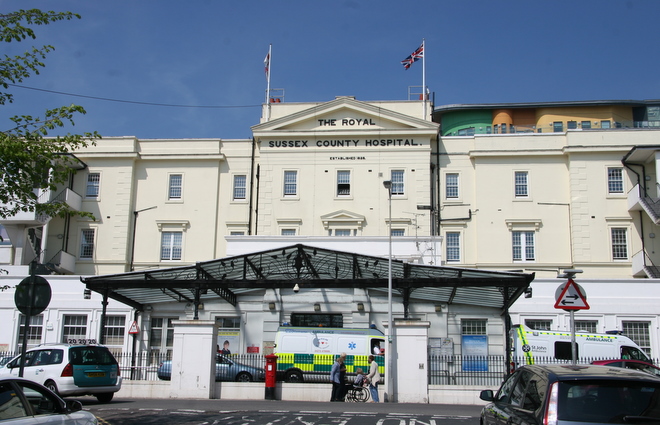The main hospital trust for Brighton and Hove could end the financial year with a deficit of almost £60 million.
The figure was described as a worst-case scenario – or a best estimate – as a series of financial challenges were spelt out to the Brighton and Sussex University Hospitals NHS Trust board this morning (Thursday 27 October).
The trust, which runs the Royal Sussex County Hospital, was placed in “financial special measures” last week.
Board members were told that the trust is currently facing a cash shortage and has borrowed almost £10 million in the past month so that it can pay its bills on time.
The problems are exacerbated by a wrangle over almost £10 million between the trust and local clinical commissioning groups (CCGs).
BSUH finance director Spencer Prosser said in a report to the trust board: “The outstanding 2015-16 year-end commissioning income has been invoiced but remains in dispute and is likely to go to arbitration.”

The trust also missed out on a performance bonus of £3.6 million from the government’s Sustainability and Transformation Fund (STF).
And it has already been fined £3 million this year for missing performance targets, with more budgeted.
The trust earned the STF bonus in the first quarter – to the end of June – but missed out in the second quarter.
Financial projections for the rest of the year do not include STF bonuses although one board member said that “of course the trust will go for it”.
While the trust is suffering a shortfall in income, partly as a result of the dispute with local CCGs, it is also overspending against its budget.
By the end of September the trust was £23.7 million over budget – almost £10 million worse than its target.

The high number of people coming to Accident and Emergency (A&E) – 5 per cent more than a year ago – remains a key reason.
The A&E workload contributed to the £3 million overspend on “consumables” such as dressings and needles while the trust also spent £4 million more on drugs. Some of those were high-cost drugs.
The trust has brought down agency costs but at the same time has spent more on staff pay.
And it has struggled to make the savings set out in its cost improvement programmes (CIPs).
A meeting was held with the regulator NHS Improvement on Monday (24 October). The “kick-off meeting” started the process of drawing up a financial recovery plan.
The initial plan will be drawn up with a month and will be assessed by a financial improvement director appointed by NHS Improvement.
The trust was placed in special measures by the Care Quality Commission (CQC) in August.
Additionally the trust was placed in financial special measures last week. It happened after the board wrote to NHS Improvement to say that it would exceed a previously agreed £15 million deficit for the year – the “control total”.
Last year the trust recorded a deficit of about £45 million.
Interim chairman Tony Kildare said: “We’ve already made clear that that control total is not realistic and we cannot sign up to it and that is why we have been designated in special measures.”
Being in special measures would bring some extra support from NHS Improvement, the board was told. Chief executive Gillian Fairfield said: “We welcome that extra support.”








